
THE DEEP SPACE NINE COMPANION


THE DEEP SPACE NINE COMPANION

The Deep Space Nine Companion summarizes all the episodes of the series with production notes, complete cast lists, and interviews with the writers. Here is what various DS9 personnel had to say about Louise Fletcher and Kai Winn.
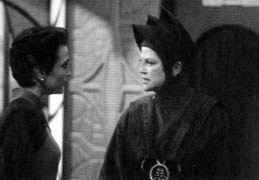
The Siege
The casting for [the second season opening trilogy], everyone agrees, was a godsend. "A terrific cast," enthuses [co-executive producer Ira] Behr. "Frank Langella, Richard Beymer, and Louise Fletcher. They were a lot of fun to write for. Seeing Fletcher and Langella together was great."
[Director Winrich] Kolbe concurs, "Between the two of them, nothing could go wrong. We were bound for glory." Langella's uncredited appearance was apparently a matter of the actor's own volition. "He wanted to do the show," says Kolbe. "He did it for his children, because they loved the show. It was not done for money or exposure."
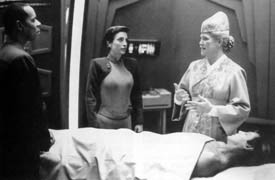
Life Support
Whether an awareness of fan interest in Bareil would have granted the vedek a stay of execution is a moot point. The episode did gain the measure of humanity the producers were looking for. "It became more of a Deep Space Nine story," says [writer Ron] Moore. "Suddenly we had some real stakes."
Bringing in Kai Winn, of course, raised the ante even more. The caliber of Louise Fletcher's contribution was appreciated by all, perhaps even more so as, according to Behr, she was extremely ill with the flu while they were filming her scenes. "In some of the dailies, we would look at her and say, 'Jesus, she has no business being up. She should be in bed,'" he recalls. "But she was a real trouper."
Shakaar
Recalls Moore, "[The script] became this debate about culture versus survival that just didn't go anywhere." Kai Winn was a latecomer to the mix and the script's dramatic salvation. It was only after the writers envisioned Winn's role in the Bajoran-Cardassian peace treaty ("Life Support") that things began to click. "We thought, 'What if she goes all the way and becomes leader of the planet?' That will really set the stakes and bring Kira into the story," says Moore.
Cast and crew alike have nothing but praise for Louise Fletcher. "Working with her is great fun," says Nana Visitor, but she admits that Kira's feelings toward Winn take center stage when they act together. "I think of how much I hate this woman," she says. "I think of what she's done. I think that my lover is dead because of her. I think of the ill-intentions toward our people."
Rapture
Louise Fletcher made her first appearance of the season, and, as Kai Winn, delivered a speech to Kira about how she spent the Occupation, which served to add some admirable qualities to her normally unsympathetic character. This was an example of the writers' fondness for standing expectations on their heads. "We like to allow the audience to hate people like Winn," says Behr, "and then give her a speech that is basically just for Kira and the audience [that contradicts their expectations]. It's a perverse thing to do."
Perverse, but necessary if one wishes to create a realistic persona. "The kai is a really important character on the show," says [writer Hans] Beimler, "and she's not one-note. She's complicated, multifaceted. That's because one of the things that Ira has always emphasized with us is to make the characters three-dimensional."
"The intention was to make her a bit less of a villain, and to force her, because of the magnitude of what Sisko was doing, to reassess her feelings about him," adds [producer] Echevarria. "He's not just a foreigner out to usurp her people. But as the show progressed, we eventually needed to get her back to another area, back to the older Kai Winn. So a moment of redemption was in her grasp, but her venality wins out in the end. And she loses."
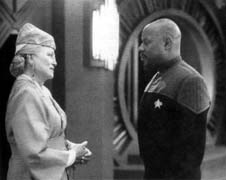
The Reckoning
"We were looking for the ultimate battle between good and evil," [writer] Bradley Thompson says. "We thought, 'Let's put a Prophet up against a Pah-wraith and deal with some deep stuff.'" During the story break session, the writers decided to have Kira possessed by the Prophet and Kai Winn possessed by the Pah-wraith. With the combatants identified, they next looked for a logical location where the two Bajoran religious entities would first appear. The legendary sacred city of B'hala ("Rapture") seemed to fit the bill. With the story opening in an ancient archaeological site and leading up to a battle between the gods, Thompson recalls, "Ira said, 'It's Godzilla versus Mothra, with a mummy movie opening.'"
Thompson and writing partner David Weddle took Behr's description to heart. "We did a mummy movie type of beginning," Thompson laughs. "And we went a little further than we'd planned."
The duo's first draft started with a vedek discovering an ancient casket, opening it, and releasing the two mysterious entities. "The battle between them had been going on for centuries," Thompson says. "Open the box and it starts again! The vedek had a heart attack, and we even had big ugly birds sitting on the tops of the walls. It was way too mummy movielike.
"And then, after the entities possess them, we had Winn and Kira stalking each other throughout the whole station, throwing fireballs at each other, and just ruining the place," Thompson continues. "Finally it just got too complicated, and when Rene joined us, he was very instrumental in smoothing it out."
Rene Echevarria, who had missed the story break, returned just as Weddle and Thompson were nearing completion on their first draft. "They had Winn and Kira running around throwing lightning bolts," he says, shaking his head. "When Steve Oster looked at it, he said, 'Hey, guys, this is a fifteen-day shoot!' And," Echevarria confides, "it was very silly."
"It definitely had the potential to come off like a bad old outer-space serial," concurs Oster.
"It took us awhile to figure it out," Echevarria says, "because the original idea had been that Sisko was going to stop this great battle. He was going to choose to protect his station and his people rather than side with the gods. But then it hit us that this was exactly the opposite of what it should have been. It wasn't that Sisko should put a stop to it, it was that Sisko should be the last man of faith. And if that was the case, then the combatants were wrong. Jake should be one of them, because Sisko would be like Abraham being asked to sacrifice his own son." With this serious turn, suddenly the story was no longer B-movie material.
Director Jesus Trevino, thinking both about the production and what was produceable, "was the one who came up with the idea of doing the battle as if it were more of a one-on-one contest of wills rather than a lot of running and jumping," sayd Echevarria.
Having the Pah-wraith that escapes inhabit Jake Sisko's body rather than Kai Winn's gave the writers the opportunity to put Winn back on a path she'd veered from a season earlier. "In 'Rapture,' she seemed to be coming around to Sisko's side a little bit," points out Echevarria. "But here she just cannot stand to see that once again he's going to steal her thunder. That was the biggest dodge we did, because we didn't really explain why she had a change of heart, but it set up what we needed to do with her later on in the series."
"'The Reckoning' really gave us a more multidimensional Kai Winn," Behr says. "We had lost sight of what to do with her for a while. We loved having her as a villain, but this really made her a tragic figure. It made her a totally screwed-up figure, and we now understood her."
Visitor doesn't think the writers made Winn feel her tragedy enough, and she really doesn't feel that Kira's words to Winn, "You defied the will of the Prophets...you're confusing faith with ambition," were harsh enough. "I know that the writers want Kira to give Winn respect because she's her spiritual leader," Visitor states, "but I can't accept the fact that she would be my leader. I think Kira would say, 'Not this woman.' I understand the need to toe a line, but if I were writing this, the language would have been a lot stronger."
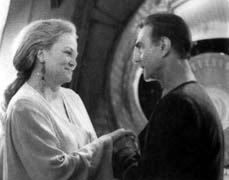
Till Death Do Us Part through When It Rains...
Complicated doesn't begin to describe what the writers had in mind for Gul Dukat. "Turning him into a Bajoran made sense," Echevarria admits. "How else could he interact with Winn? He had to have the surgery."
"The story dictated it," Behr agrees. "The way Dukat was going, getting involved with Bajoran religion, the next step would be to go to Bajor, and to Winn. Bringing together two of the best villains ever and giving them this intricate relationship was truly Shakespearian in its scope. The lust. The hate. The manipulation. It was just fun!"
As with the previous year's arc, Weddle and Thompson were second at bat, this time with "'Til Death Do Us Part" (formerly known as "Umbra"). The episode includes an important wedding, the creation of a powerful political alliance, and one of the most perverse pairings in Star Trek. "The idea of Dukat wooing Kai Winn appealed to us on a very twisted level," grins Thompson. "Our two bad guys were going to mate! We were howling with glee at the idea."
How did it come about? "Ira had said, just as a throwaway kind of thought, 'It's too bad we can't get Winn and Dukat in bed together,'" recalls Moore. "And I said, 'Well, why can't we do that?' And everyone just stopped and said, 'Wait, that's a great idea.'"
"The two characters are so worthy of scene after scene after scene," Behr rhapsodizes. "And when we decided that they actually were going to have a physical relationship, it was just dementedly wonderful."
"The whole thing worked really well," says Echevarria. In fact, compared to the struggles that the writers had with some of the other plot lines, there was only one problem with the Dukat/Winn story. "We started it too soon and we ran out of story for them," he notes. "Suddenly we realized that we didn't need them again until the final episode."
"We had to find a way to get the audience to stop thinking about them for a while," continues Behr. Which led to another example of what Behr considers to be the series' unofficial motto, particularly at the end of the final season: "Make it a virtue!"
"Every time we got stuck and something wasn't working, we'd say, 'Let's make it a virtue!' We should have had T-shirts made up," Behr grins. "So that's what we did. We blinded Dukat and had Winn send him out begging."
The scene where Kira suggests that Winn step down from her role as kai wound up in Moore's hands. "That was a very tough scene," says Behr. "It came about late in the process, and Ron took a lot of passes at it." Tone was the elusive quality the writers sought. "Kira had to do something which, on one level, could seem very cruel and dismissive," Behr explains. "She's not giving this woman anything to hold on to, really. But at the same time, you have to understand that Winn is a total loss, that she just doesn't get it. She thinks she's going to get it. That's the key! It's intricate stuff. You think maybe she's going to get it, but she just can't. She's blind."
Winn, who had her chance for atonement in the previous episode, plunges headlong into sin [in "The Changing Face of Evil"], kills Solbor, the true believer in her camp. And still, says Behr, she doesn't see the light. "She experiences self-loathing, and loss, and you wonder, 'Okay, does she get it now?' No, she doesn't. As soon as Dukat explains to her that she can cover the murder up, it's clear that she's the only thing she's worried about. It's always her. It's a very shocking, scary, pathetic moment that shows that power isn't a wonderful thing. Power can only twist."
Of course, Behr smiles, despite all of Winn's horrible behavior, "when the smoke clears, she's still less tainted than Dukat. Dukat is still the master, the manipulator, the liar. They're quite a team."
Although Dukat was still the master, he would have the wind knocked out of his sails in the following show, "When It Rains..." Dukat is blinded by the Pah-wraiths. The primary source of Dukat's injury was the fact that the writers had nowhere to take his or Winn's characters for the subsequent three episodes. "I was told, 'Find a way to stall,'" says Echevarria. "I needed to leave them in a place where the audience would feel, 'Okay, they're doing this, but I don't need to see them do it.' And I came up with the idea of blinding Dukat. Now, truth be told, I didn't really have a specific intention when I wrote that, but I can justify it after the fact. The Pah-wraiths knew that they needed to maneuver these two people to get them into the caves. They needed her to get him there, and they needed him to die there, so that they could use his body. If he had read in the book, 'You will be killed and be reborn,' he might not have gone for it." Thus, the Pah-wraiths blinded him, and Winn was given a few weeks to read the book in peace and quiet.
"One of the great things about the series is how certain characters evolve," says David Weddle. Case in point, he explains, is Winn's longtime aide, Ranjen Solbor, introduced in "'Til Death Do Us Part." "We wrote a scene in his first episode where he serves tea to Winn and Dukat. And Dukat says he's hardly worthy to be having tea with the kai and to be served by a ranjen. We noted in the script that Solbor's expression should show that he agreed with that. We gave him a little attitude. The actor just played it so well that we all started laughing when when we were watching the dailies."
"I just fell in love with Solbor, and with James Otis, the actor who plays him," enthuses Behr. "He was exactly what I wanted: a true believer. He was just meant to be your typical lackey, but the actor came in playing this kind of shaky, emotionally constipated guy who radiated fierce devotion. He delivered his lines in a way that showed multiple levels. He was a hoot! As soon as I saw him in dailies, I said, 'Get him for two more episodes!'"
Plotting out the paths of their dynamic repertoire of side characters made the final arc exciting for the producers. "We knew that Marc Alaimo would get turned on by playing the seemingly kind, sweet Anjohl in the scenes with Winn," says Behr. Throughout the seven years of the series, the executive producer adds, Alaimo never faltered in his belief that Dukat was, at heart, a good guy. "In Marc's mind, I believe he felt his relationship with Winn was legitimate in some way, and that, in some wacky fashion, it was Dukat's bid for legitimacy. I mean, Marc actually was upset when we had him hit Solbor. Until the very end, he wanted Dukat to be the hero of Deep Space Nine."
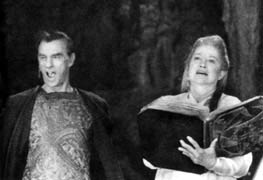
What You Leave Behind
There were a few significant deaths in the episode. Gul Dukat's for one. "I was so mad that I didn't get to kill him," says Nana Visitor, sounding far more like her alter ego, Kira Nerys. "I mean, it was my character that he tortured all those years!"
Ira Behr sighs. It seemed clear to him that Sisko, as the show's primary hero, and Dukat, as its primary villain, had to square off in the end. However, not everyone saw it that way. "Everyone wanted to kill Dukat," he laughs. "Dukat had to kill Winn, because they had sex. And we all know that if you have sex in the movies, you have to die. Look at Halloween. Look at Scream."
One thing that Behr regrets is that he never had the opportunity to do an episode that he refers to internally as "Fun in Hitler's Bunker," that is, a look at the final days of the war from the point of view of the bad guys. "Dukat, of course, always got a lot of stuff to do. But if you look at the female shape-shifter, and Kai Winn, and Weyoun, and Damar -- they've never been better. Because we had the chance to give them so many different levels to play. I mean, Louise Fletcher just kicked ass in that final arc."
Copyright Pocket Books 2000.
